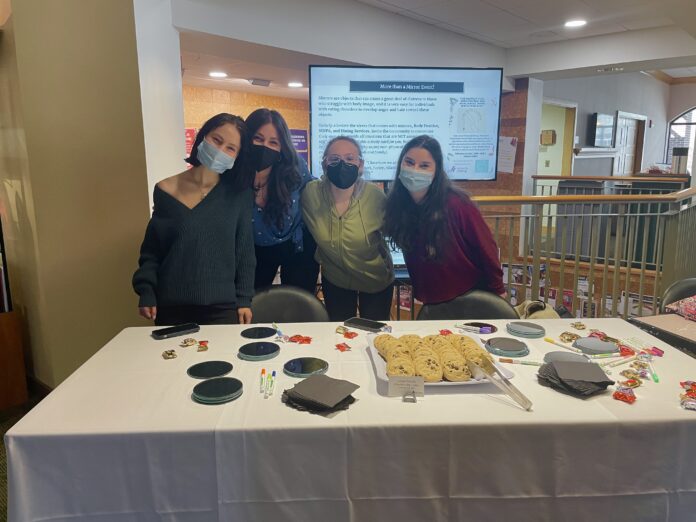“At Body Positive, we say that a body is like a lamp,” Renee Levine ‘22, co-president of Body Positive, recited during the “More than a Mirror” event on Feb. 23. This unique philosophy has a simple conclusion: “When you walk into a room and see a lamp, you just think: it’s a lamp. It’s neutral. So if a body is like a lamp and a lamp is neutral… a body is neutral, too.”
This message was at the heart of “More than a Mirror.” The smiling students sitting behind a long table at the Seegers Union entrance on Feb. 23 looked at first glance like they might have been hosting a bake sale. After all, there were treats all over the table and the event was proudly co-hosted by Dining Services. But between the cupcakes and cookies, there were other objects for table visitors to take and use: mirrors and markers, ready for students to take up and write themselves messages on these reflective surfaces.
“To help alleviate the stress that comes with mirrors, Body Positive, Mental Health Peer Advocates (MHPA), and Dining Services invite the community to customize their own mirror with affirmations that are NOT associated with one’s body,” read the mission statement projected on a screen behind the table.
This event marked the first collaboration between these three organizations. Despite their differing missions, they shared a common goal: to share a general message regarding body positivity and to reduce the stigma around these conversations. “The point of MHPA is to raise awareness and reduce the stigma on campus surrounding various mental health issues and challenges. And eating disorders are stigmatized disorders that many people don’t really understand. So we decided to collaborate with Body Positive to raise some more awareness,” Libey Eynan ‘25 explained.
“A body is like a lamp… It’s neutral.”
Renée Levine ’22
“We’re bringing positive affirmations to items that can be stressful and can be triggering to individuals who struggle with body image and eating disorders. We want to create a more positive relationship with these objects and encourage others to spread positivity by writing down affirmations about themselves and their friends,” Levine elaborated.
Beyond writing their own affirmations on handheld mirrors, people who attended the event were encouraged to write messages on a Post-It note to stick to a larger mirror as well. As the amount of notes multiplied, this led to a frame of inspiring, encouraging and colorful notes around the body-length reflection in the mirror. Messages included phrases like “trust your intuition” and “you are worthy.”
“I think the practice of writing affirmations is important because you’re actually writing out positive things,” Abigail Bresalier ‘25, a member of Mental Health Peer Advocates, stated. “Writing it down commits it more to memory and it also spreads the positivity and encourages others to join in on that pattern. It’s a chain of inspiration and positive feedback for yourself and others.” There were suggestions for affirmations that did not relate to body image on the board behind the table like, “I love how we always have a great time together” and “You are so smart!”
“…eating disorders are stigmatized disorders that many people don’t really understand. So we decided to collaborate with Body Positive to raise some more awareness.”
– Libey Enyan ’25
Positive affirmations are one step in the right direction. The goal of removing the stigma and continuing these conversations is ongoing. National Eating Disorder Awareness Week took place from Feb. 21-27 this year, but the push for positive body image takes place year round. “We hope to do more events like this in the future. We need to talk about this stuff not just on the one week where everyone is talking about it. This stuff doesn’t go away for people in recovery or who have recovered,” Enyan emphasized.
If you or someone you know is suffering from an eating disorder, visit www.nationaleatingdisorders.org to access online resources or contact their hotline at 1-800-931-2237.
Ally is a senior English major with minors in creative writing and French. If she's not writing, which she usually is, she's probably drinking iced coffee, struggling to keep her plants alive or finishing books just so she can update her Goodreads account.






















